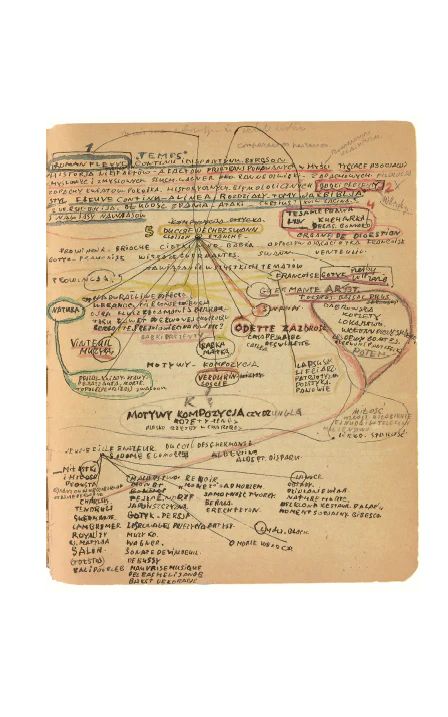
Call for Papers: Romanic Review special issue "Proust in Prison"
Among more than a thousand books devoured by the prison inmate David Genis, Marcel Proust’s famous novel took him one year to finish. “He read In Search of Lost Time alongside two academic guidebooks, full of notations in French, and a dictionary. He said that no other novel gave him as much appreciation for his time in prison. ‘Of course, we are memory artists as well…,’ he wrote of prisoners in his journal, in the entry on Time Regained. ‘Everyone inside tries to make their time go by as quickly as possible and live entirely in the past,’ he said. ‘But to kill your days is essentially to shorten your own life.’ In prison, time was both an enemy and a resource, and Genis said that Proust convinced him that the only way to exist outside of it, however briefly, was to become a writer himself… Later, when he came across a character in a Murakami novel who says that one really has to be in jail to read Proust, Genis said that he laughed louder than he had in ten years.” (https://www.newyorker.com/books/page-turner/a-prisoners-reading-list)
David Genis’s testimonial belongs to a small corpus of texts that deserves our attention as it is at the crossroads of memory studies and reception aesthetics. Some critical writing on Proust’s great novel happened inside prison camps (such as that of Josef Czapski), and a good deal of retrospective fictions, autobiographies and auto-fictions by inmates recur to the Recherche not only as a reference to the existential reality made up by cells, corridors, interrogatory rooms, and compounds (such as that of Horst Bienek, Varlam Chalamov, Nicolae Balota, Nicolae Steinhardt), but also to the trauma experienced on the way towards (Jorge Semprún) and back from (Norman Manea) the concentration camps. Although Dante, Dickens, Dostoevsky and other authors may fulfil similar functions, and are often situated in Proust’s neighbourhood, the Recherche stands out because of its contemporaneity: indeed, some of the prisoners were the very critics and translators who introduced the French author to their country before they became victims of repression.
Reading these texts allows some insight into specifically literary forms of remembering the multiple horrors of the 20th Century, as well as into the ways culture would enter prisons, into the meaning of “reading” and the sense of reading in such extreme situations. This corpus also provides a specific perspective on Proust’s work, that may or may not have earned these references due to its particular stance on memory, imprisonment, trauma, or literature. The special issue of Romanic Review welcomes contributions on literary texts and essays that address Proust and Prisons, such as those mentioned in this call for papers. Contributions may be written in English, French or Spanish, and should not exceed 7000 words. 500-word-abstracts are to be sent till 1 July 2023 to Prof. Dr. Matei Chihaia (chihaia@uni-wuppertal.de).
Illustration: From Josef Czapski's lecture notes, as reproduced in Karpeles 2018.
—
Further Reading :
Blanche Cerquiglini et al.: Proust-Monde. Quand les écrivains étrangers lisent Proust. Paris: Gallimard 2022.
Pascale Fravalo-Tane: ‘Mein Combray war Gleiwitz’: mémoire et création romanesque chez Horst Bienek. In: Dorle Merchiers / Gérard Siary (Ed.): Transmission de la mémoire allemande en Europe centrale et orientale depuis 1945, Bern: Peter Lang 2011, 265-275.
Arno Gimber: Marcel Proust en W.G. Sebald o la capitulación ante el olvido. In: Lourdes Carriedo / Luisa Guerrero (Ed.): Marcel Proust : écriture, réécritures. Dynamiques de l’échange esthétique, Berlin: Peter Lang 2010, 343-351.
Alex Halberstadt: A Prisoner’s Reading List. The New Yorker, 07.07.2014. URL: https://www.newyorker.com/books/page-turner/a-prisoners-reading-list (16.01.2023).
Claude Haas: Die Madeleine im Gulag. Pirouetten über Warlam Schalamow und Marcel Proust. In: Dirk Naguschewski / Matthias Schwartz (Ed.): Schalamow. Lektüren, Berlin: Matthes&Seitz 2018, 78-91.
Ina Hartwig: Der unerreichbare Zuckerwürfel. Laudatio zum Nelly-Sachs-Preis auf Norman Manea. Sinn und Form 2 (2012), 419-423.
Eric Karpeles: Lost Time: Lectures on Proust in a Soviet Prison Camp. New York: NYRB Classics 2018.
Sabine Mainberger / Neil Stewart (Ed.): À la recherche de la recherche : les notes de Joseph Czapski sur Proust au camp de Griazowietz, 1940–1941. Lausanne: Les Éditions Noir sur Blanc 2016.
Guillaume Perrier: ‘Douces choses férocement lointaines’: deux lectures de Proust dans les camps soviétiques. Amnis 9, 2010. URL : http://journals.openedition.org/amnis/822 (30.08.2018).
Nicolas Ragonneau: Rebatet et Cousteau, quand deux vaincus lisaient Proust en prison. Proustonomics, 18.01.2023. URL: https://proustonomics.com/rebatet-et-cousteau-quand-deux-vaincus-lisaient-proust-en-prison/ (19.01.2023).
Nicolas Ragonneau: Proust forteresse : la Recherche comme rempart existentiel. Proustonomics, 02.05.2020. URL: https://proustonomics.com/proust-forteresse-la-recherche-comme-rempart-existentiel/ (19.01.2023).